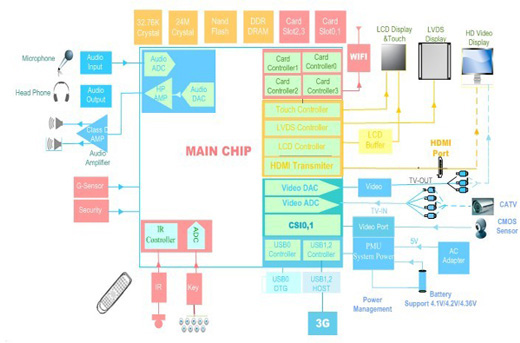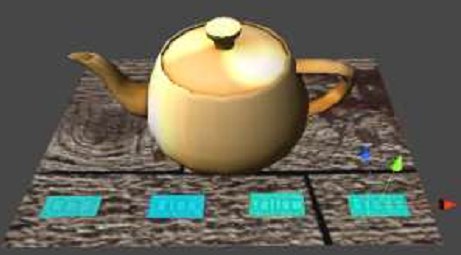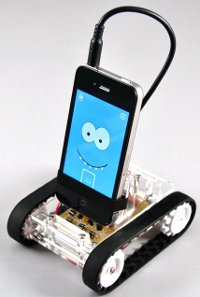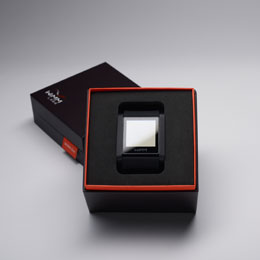AllWinner A10 (part of A1X series) is an ARM Cortex A8 SoC targetting multimedia products such as tablets, HD STB or digital signage. It is currently found in some low cost Android tablets such as Momo9C and will be used in Rhombus Tech’s Raspberry Pi alternative. The processor features an ARM Cortex A8 clocked at 1.5 Ghz with a Mali-400 GPU. It can support 1080p encoding/decoding, provides HDMI, Component, Composite, VGA and LVDS video outputs, USB2.0 ports, a SATA 2.0 port and more… Here are the key features of the Allwinner A10: VPU (Video Processing Unit) HD Video Decoding (Super HD 2160P/3D Film) Support all popular video formats, including VP8, AVS, H. 264 AVC, VC-1, MPEG-1/2/4, … HD Video Encoding (H.264 High Profile) Support encoding in H.264 format DPU (Display Processing Unit) MULTI-CHANNEL HD displays Built-in HDMI YPbPr, CVBS, VGA LCD interfaces: CPU, RGB, LVDS up to Full HD Memory […]
Special Developer Edition (SDE) for Archos G9 Tablets
Back in October, Archos released the GPL source code for Archos G9 Tablets and at the time the Special Developer Edition (SDE) was not released even though it is available for G8 devices. Now the SDE has still not been officially released, but I found a forum post on XDA Developers Forum explaining how the SDE Menu could be enabled by following the instructions below. Root your device with Paul O’Brien’s root here. (it won’t work if the device is not rooted) Unzip the content of gen9_enable_sde.zip to a directory. Launch the script enable_sde. Reboot into recovery mode, you should have the SDE menu now, you can flash your own kernel+initrd the same way it was done on previous generation. One trick: the initramfs should be still named initramfs.cpio.gz, but it should be compressed with lzma with current kernel. Another trick: to get rid of paul’s root as it messes up […]
Qt Labs Releases Qt 4.8.0
Qt Labs has just announced the release of Qt 4.8.0 featuring Qt Platform Abstraction, threaded OpenGL support, multithreaded HTTP and optimized file system access. Here are some of the new key features in Qt 4.8.0: Qt Platform Abstraction (QPA) QPA restructures the GUI stack to enable easier porting of Qt to different windowing systems and devices. Previously called Lighthouse. Threaded OpenGL supportEnables developers to render OpenGL from more than one thread concurrently. See Threaded OpenGL in 4.8 for more details. Multithreaded HTTP HTTP requests are now handled in a separate thread by default. This should make application guis smoother, as networking will no longer use the main event loop. Optimized file system access The file system stack received some heavy lifting under the hood. The result is better I/O performance, achieved by reducing the number of system calls performed for I/O and by better use of cached data, when available. […]
Metaio Releases Mobile Augmented Reality SDK
Yesterday Qualcomm released QCAR SDK 1.5 Beta, and today Metaio announces its Mobile SDK 3.0 for augmented reality application development on Android and iOS. The metaio Mobile SDK brings with it patented gravity-awareness and visual tracking technology for 2D and 3D objects, now three times more robust than the previous version. These features combined will ensure AR experiences that are more natural, more intuitive, and more realistic, says the company. Metaio recently announced formal collaborations with ARM, ST-Ericsson and Texas Instruments to fully take advantage of the GPU hardware provided by those companies and the Mobile SDK is optimized for ARM Mali GPU (both graphics and compute), ST Ericsson Nova and NovaThor mobile processors and TI OMAP processors. The metaio Mobile SDK also includes its own 3D rendering engine – now with advanced shader support – and a plugin to make use of Unity3D (3D game engine). You can watch […]
Qualcomm Releases Augmented Reality SDK 1.5 Beta for Android
Qualcomm has just announced the availability of QCAR SDK version 1.5 Beta 1 for Android. is now available for download. The Key features and improvements in this version of the QCAR SDK include: Video background texture access: The SDK now provides a simple and streamlined way of accessing the video background texture. Developers can now write custom special effects using powerful shaders resulting in far more exciting application experiences. Swapping datasets at runtime: If your app needs to augment more than 60 images, you can now create multiple datasets – using the web-based Target Management System (My Trackables tool)- and load the appropriate dataset at runtime. You no longer have to upgrade your app to change the target dataset, and you can now build AR experiences that work on a large number of images. Improved tracking performance: The new SDK features several enhancements that reduce jitter in the augmentations, speed […]
“Romo” Robot Controlled by Android or iOS Smartphones
Romotive startup has designed “Romo”, a tank-like Robot controlled by Android or/and iOS mobile devices. Peter Seid and Phu Nguyen – Romotive’s co-founders – have raised over 114,000 USD on KickStarter website from more than 1,100 contributors looking to buy the Romo robot. The company has reached its founding target (32,000 USD) and can now move forward on production. You can still get the Robot for 78 USD (+12 USD shipping if you live outside the US) on KickStarter. You’ll need two Android or iOS devices to play with it: one acting as a camera that sits on the “Romo” and the other to control the robot’s movements and receive the camera stream via Wi-Fi. The motors are interestingly controlled by audio signals coming from the smartphone. Romo’s Hardware is composed of the following: A motorized, acrylic base with an accessory port that can be controlled by any smartphone (or […]
Android NDK Revision 7 for Android 4.0 (ICS)
Google has just released Android Native Development Kit Revision 7, the Android SDK that allows developers to reuse C/C++ code. This version adds new native APIs available in Android 4.0. Here’s the changelog of the most important new features and bug fixes: NDK APIs for Android 4.0 (API level 14): Low-level streaming multimedia: A new API based on Khronos OpenMAX AL 1.0.1 provides a direct, efficient path for low-level streaming multimedia. The new path is ideal for applications that need to maintain complete control over media data before passing it to the platform for presentation. Audio decoding into PCM: Extensions to the existing native audio API based on Khronos OpenSL ES let native apps decode compressed audio assets to PCM format. CCache support to allow faster rebuilds. Added support for setting APP_ABI to all to indicate that you want to build your NDK modules for all the ABIs supported by […]
WIMM One Developer Preview Kit is Now Available
WIMM Labs has just announced the availability of its wearable Android-based reference platform and software development kit. It can be purchased for 299 US dollar and is only available in the US. It is currently only available to registered developers but will be available to all by the 9th of November. The WIMM One Developer Preview Kit includes: WIMM One Module Black wrist strap Charging kit: Paddle charger, USB cable, USB power adapter Here’s the email registered developers received: We are thrilled that you expressed early interest in the WIMM One Developer Preview and we’d like to invite you to be among the first to purchase a WIMM One during our limited release. From now until November 9, the store will only be open to those who’ve reserved in advance. Just register at dev.wimm.com using this email address and purchase your WIMM One Preview for $299. Inventory is limited and […]








